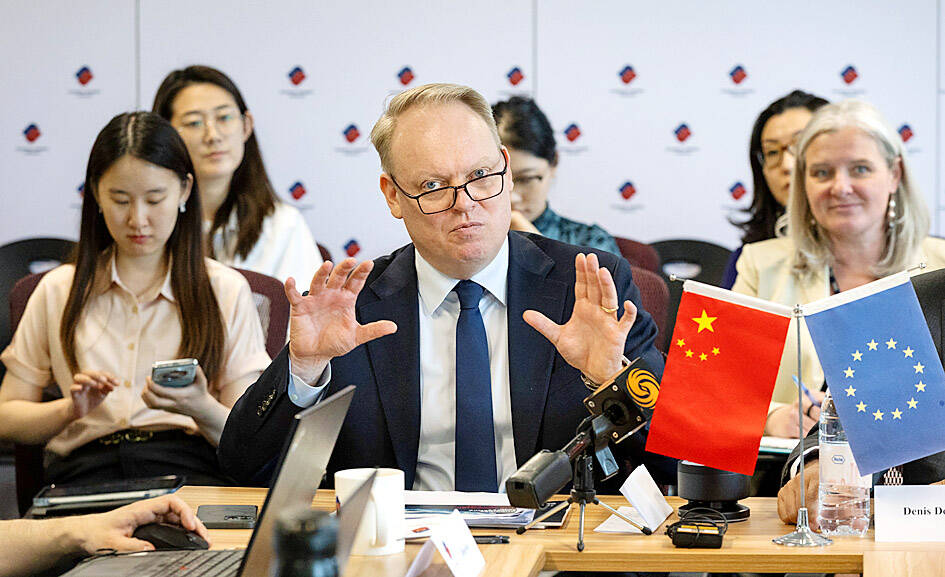European companies are cutting costs and scaling back investment plans in China as its economy slows and fierce competition drives down prices, an annual survey released yesterday showed.
Their challenges reflect broader ones faced by a Chinese economy hobbled by a prolonged real-estate crisis that has hurt consumer spending. Beijing also faces growing pushback from Europe and the US over surging exports.
“The picture has deteriorated across many key metrics,” the EU Chamber of Commerce in China said in the introduction to its Business Confidence Survey.

Photo: EPA-EFE
The same forces that are driving up Chinese exports are depressing the business outlook in the Chinese market. Chinese companies, often enticed by government subsidies, have invested so much in targeted industries such as electric vehicles (EVs) that factory capacity far outpaces demand.
The overcapacity has resulted in fierce price wars that cut into profits and a parallel push by companies into overseas markets.
In Europe, that has created fears that growing imports from China could undermine its own factories and the workers they employ. The EU slapped tariffs on Chinese EVs last year, saying China had unfairly subsidized electric vehicle production.
“I think there’s a clear perception that the benefits of the bilateral trade and investment relationship are not being distributed in an equitable manner,” EU Chamber of Commerce in China president Jens Eskelund told reporters earlier this week.
He applauded efforts by China to boost consumer spending, but said Beijing must also take steps to ensure that supply growth does not outpace that in demand.
The survey results show that the downward pressure on profits increased over the past year and that a fall in business confidence has yet to bottom out, Eskelund said.
About 500 member companies responded to the survey between mid-January to mid-February.
“It is just very difficult for everyone right now in an environment of declining margins,” he said.

IN THE AIR: While most companies said they were committed to North American operations, some added that production and costs would depend on the outcome of a US trade probe Leading local contract electronics makers Wistron Corp (緯創), Quanta Computer Inc (廣達), Inventec Corp (英業達) and Compal Electronics Inc (仁寶) are to maintain their North American expansion plans, despite Washington’s 20 percent tariff on Taiwanese goods. Wistron said it has long maintained a presence in the US, while distributing production across Taiwan, North America, Southeast Asia and Europe. The company is in talks with customers to align capacity with their site preferences, a company official told the Taipei Times by telephone on Friday. The company is still in talks with clients over who would bear the tariff costs, with the outcome pending further

WEAKER ACTIVITY: The sharpest deterioration was seen in the electronics and optical components sector, with the production index falling 13.2 points to 44.5 Taiwan’s manufacturing sector last month contracted for a second consecutive month, with the purchasing managers’ index (PMI) slipping to 48, reflecting ongoing caution over trade uncertainties, the Chung-Hua Institution for Economic Research (CIER, 中華經濟研究院) said yesterday. The decline reflects growing caution among companies amid uncertainty surrounding US tariffs, semiconductor duties and automotive import levies, and it is also likely linked to fading front-loading activity, CIER president Lien Hsien-ming (連賢明) said. “Some clients have started shifting orders to Southeast Asian countries where tariff regimes are already clear,” Lien told a news conference. Firms across the supply chain are also lowering stock levels to mitigate

NEGOTIATIONS: Semiconductors play an outsized role in Taiwan’s industrial and economic development and are a major driver of the Taiwan-US trade imbalance With US President Donald Trump threatening to impose tariffs on semiconductors, Taiwan is expected to face a significant challenge, as information and communications technology (ICT) products account for more than 70 percent of its exports to the US, Chung-Hua Institution for Economic Research (CIER, 中華經濟研究院) president Lien Hsien-ming (連賢明) said on Friday. Compared with other countries, semiconductors play a disproportionately large role in Taiwan’s industrial and economic development, Lien said. As the sixth-largest contributor to the US trade deficit, Taiwan recorded a US$73.9 billion trade surplus with the US last year — up from US$47.8 billion in 2023 — driven by strong

RESHAPING COMMERCE: Major industrialized economies accepted 15 percent duties on their products, while charges on items from Mexico, Canada and China are even bigger US President Donald Trump has unveiled a slew of new tariffs that boosted the average US rate on goods from across the world, forging ahead with his turbulent effort to reshape international commerce. The baseline rates for many trading partners remain unchanged at 10 percent from the duties Trump imposed in April, easing the worst fears of investors after the president had previously said they could double. Yet his move to raise tariffs on some Canadian goods to 35 percent threatens to inject fresh tensions into an already strained relationship, while nations such as Switzerland and New Zealand also saw increased